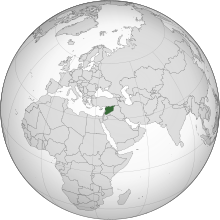Cannabis in Syria
 Location of Syria (dark green) | |
| Medicinal | Illegal |
|---|---|
| Recreational | Illegal |
Cannabis in Syria is illegal. Under the policies of the Syrian Arab Republic cannabis is illegal and punishable by up to 20 years in prison in large drug trafficking offenses, if someone is considered an addict by the Syrian government then they face no criminal penalties for drug use and possession.[1] Since the start of the Syrian civil war cannabis laws have become widely unenforced by the Syrian government as well as Kurdish and rebel controlled territories, while civilians growing cannabis in Jabhat al-Nusra controlled territory face arrest.[2] On multiple occasions Bashar al-Assad granted general amnesties to multiple crimes which included drug trafficking offenses.[3]
Legality
[edit]The cultivation, sale, and possession of cannabis for recreational or medical purposes are illegal in Syria.[4]
History
[edit]Under the French mandate system in the early 20th century, Syria and Lebanon were major cannabis producers. Following the 1925 International Opium Convention, the League of Nations endorsed an agenda against cannabis and other drugs. The enforcement of this anti-cannabis agenda was placed on the French administration under international supervision.[5]
Under President Shukri al-Quwatli (1943–1949), the cultivating of cannabis was banned in Syria, though authorities noted they had little ability to prevent the Druze of the Jabal al-Druze region from producing hashish.[6]
In 1993, Syria enacted Law No. 2 which authorizes punishment, up to and including capital punishment, for the manufacture, transportation, and sale of narcotics.[7]
Civil War
[edit]As the country has become destabilized as a result of the civil war, people living in areas controlled by the Syrian Democratic Forces and rebel controlled territories have begun growing cannabis as a way of making money to fight poverty.[8]
During the civil war cannabis was sold to and used by Syrian Arab Army soldiers, ISIS soldiers and Syrian rebels.[9][10][11]
References
[edit]- ^ Ali, Tareq (18 May 2017). "Syrians Turn to Drugs to Forget the Burden of War". Raseef.
- ^ Abdallah, Omar (23 July 2014). "In Idlib, a Thriving Marijuana Industry Comes Under Assault". Daily Beast.
- ^ "Syria's Assad grants amnesties before presidential election". ABC. 2 May 2021.
- ^ "Cannabis in Syria". Canna Connection. Archived from the original on 4 May 2021. Retrieved 4 May 2021.
- ^ Bourmaud, Phillippe (March 2016). "Turf Wars at the league of nations: International anti-cannabis policies and oversight in Syria and Lebanon, 1919-1939". The League of Nations' Work on Social Issues. pp. 75–87. ISBN 9789210577021. Archived from the original on 2021-05-04. Retrieved 2021-05-04.
- ^ Thomas Philipp; Birgit Schäbler (1998). The Syrian Land: Processes of Integration and Fragmentation : Bilād Al-Shām from the 18th to the 20th Century. Franz Steiner Verlag. pp. 383–. ISBN 978-3-515-07309-7. Archived from the original on 2021-05-28. Retrieved 2017-12-24.
- ^ William R. Brownfield (1 May 2011). International Narcotics Control Strategy Report: Volume I: Drug and Chemical Control. DIANE Publishing. pp. 586–. ISBN 978-1-4379-8272-5. Archived from the original on 19 May 2017. Retrieved 15 December 2016.
- ^ Ahmad, Rozh (24 August 2012). "Poverty Leading to Marijuana Farms in Kobane". Rudaw. Archived from the original on 2012-10-08. Retrieved 17 December 2012.
- ^ Rosenfeld, Jesse (12 July 2017). "This Is Where ISIS Gets Its Weed". Daily Beast.
- ^ Abdallah, Omar (23 July 2014). "In Idlib, a Thriving Marijuana Industry Comes Under Assault". Daily Beast.
- ^ Makropulos, Juan (19 June 2013). "I Smoked Hash and Watched Cute Animal Videos with Syrian Rebels". Vice.
